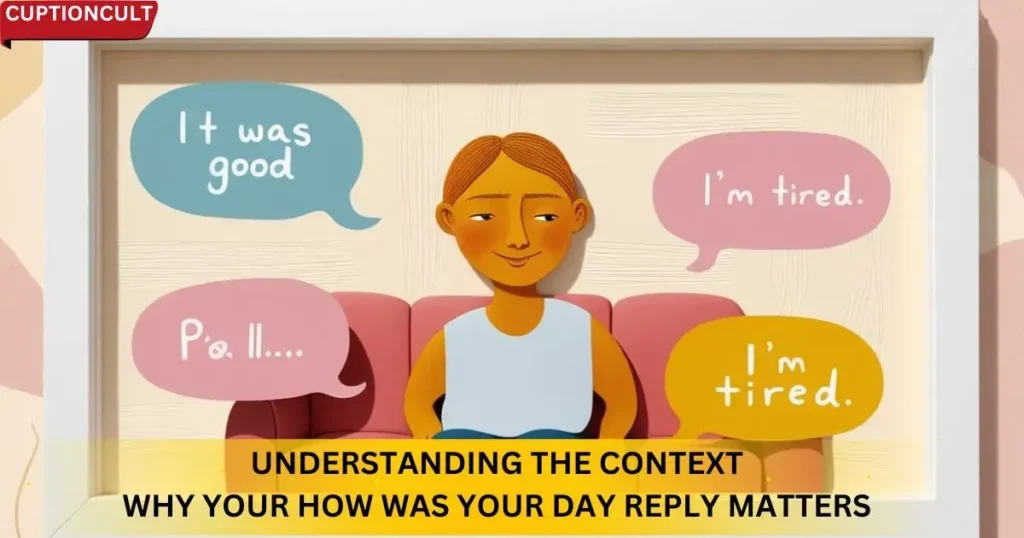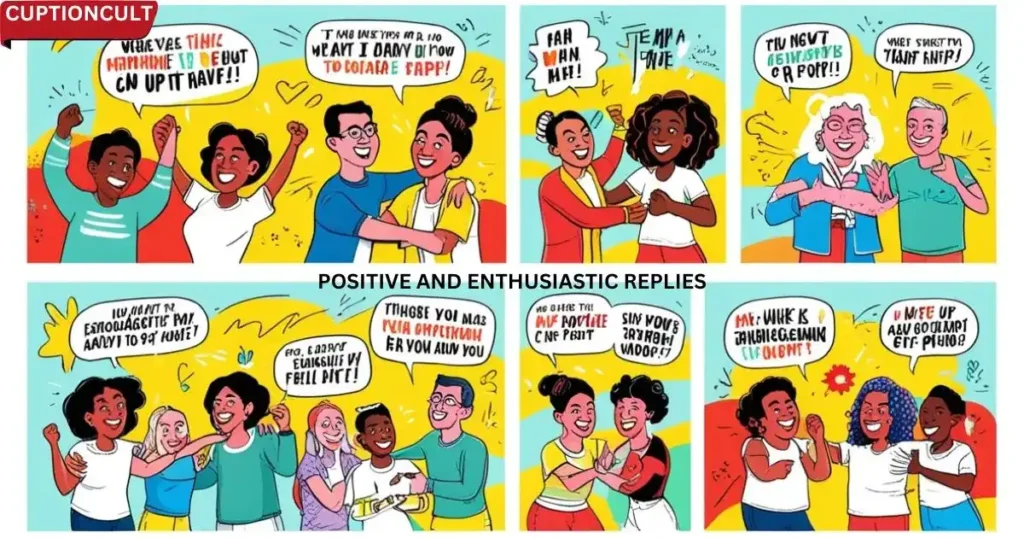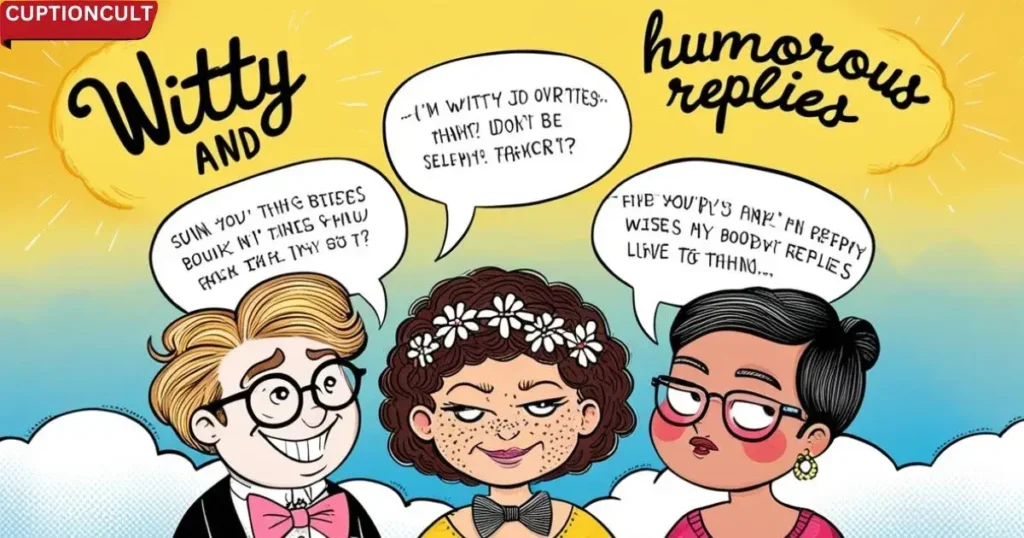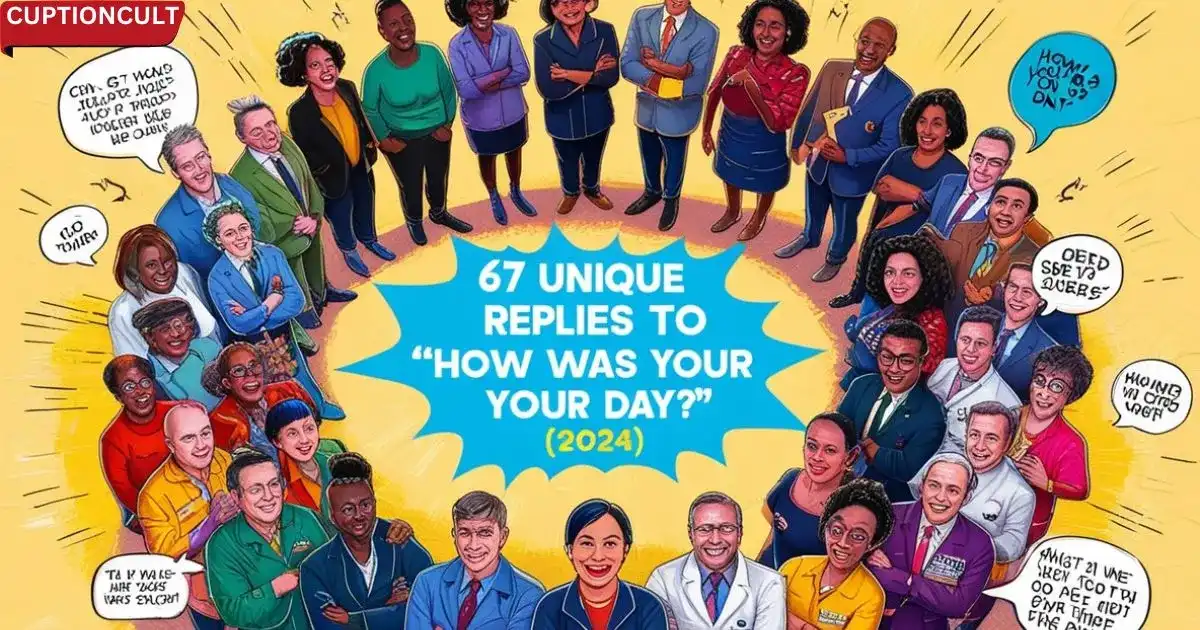The seemingly simple question “how was your day reply” is a complex social interaction that goes beyond mere small talk. It’s a nuanced how was your day reply that serves as a gateway to deeper communication, connection, and understanding between individuals. In the realm of conversational AI and interpersonal communication, this question represents a critical moment of potential connection or disconnection.
Understanding the Context: Why Your How Was Your Day Reply Matters

The seemingly innocuous question, “How was your day?,” is rich in interpersonal communication. It’s not just a request for factual information; it’s an invitation to connect, a social probe revealing much about individual dynamics. Your how was your day reply signals not only the quality of your day but also the nature of your relationship with the questioner. A simple “Good” might suffice with a casual acquaintance, but a more detailed and nuanced how was your day reply is expected from close friends and family.
A curt response could indicate disinterest or even resentment, while an overly enthusiastic response might seem insincere. Using the right how was your day answer demonstrates emotional intelligence and awareness, which are vital for successful social interactions. The analysis of such responses, employing techniques like sentiment analysis, can even reveal insights into individual emotional states.
67+ Creative and Insightful How Was Your Day Replies
Here are 67+ diverse how was your day replies, each with a brief explanation and contextual considerations:
Positive and Enthusiastic Replies:

- “Absolutely fantastic! I [mention a specific positive event or accomplishment].” (Emotions: happiness, excitement; Activities: project completion, relaxation)
- “It was blissful! I spent the afternoon [mention a relaxing activity].” (Emotions: bliss, enjoyment; Activities: relaxation, social interaction)
- “Productive and fulfilling. I finally [mention accomplishment].” (Work-related terms: productive, goals; Context-specific terms: fulfilling)
- “Amazing! I had a great [mention activity] with [mention a person].” (Emotions: happiness; Activities: social interaction; Relationships: friends, family)
- “It was a day filled with laughter and joy!” (Emotions: happiness, joy)
- “I can’t complain! Everything went smoothly.” (Emotions: contentment)
- “Pretty awesome, thanks for asking!” (Polite queries: politeness)
- “It was a great day for [mention something specific, e.g., reading, walking].” (Activities: reading, walking)
- “Wonderful! I’m feeling really good.” (Emotions: happiness; Context-specific terms: wonderful)
- “Amazing! I feel so energized.” (Emotions: energy)
Neutral Replies:
- “It was a good day. How about yours?” (Polite queries: politeness; Conversational Tone: casual)
- “It was pretty average. Nothing too exciting.” (Context-specific terms: average)
- “A bit of everything, really. How was yours?” (Conversational Tone: casual)
- “Busy but good. How’s your day going?” (Work-related terms: busy)
- “It was okay. How was yours?” (Conversational Tone: casual)
- “It was a day. What about yours?” (Conversational Tone: casual)
- “Long, but productive. What did you get up to?” (Work-related terms: productive; Timeframes: long)
- “Pretty uneventful. How was yours?” (Context-specific terms: uneventful)
- “Just another day in paradise! Or not… How’s yours going?” (Humor and Playfulness: sarcasm)
- “Survived another day. How’s your day been?” (Humor and Playfulness: self-deprecating humor)
Negative but Positive-leaning Replies:
- “It was a challenging day, but I got through it.” (Emotions: stress; Context-specific terms: challenging)
- “It had its ups and downs, but overall, it was okay.” (Discourse Markers: overall)
- “A bit stressful, but I managed to stay afloat.” (Emotions: stress; Context-specific terms: stressful)
- “It was long and tiring, but rewarding in the end.” (Emotions: exhaustion; Context-specific terms: tiring, rewarding)
- “A bit hectic, but I learned a lot.” (Context-specific terms: hectic)
- “It was tough, but I’m glad it’s over.” (Emotions: exhaustion)
- “It started rough, but ended well.” (Timeframes: start and end)
- “It was challenging, but I’ve enjoyed it!” (Emotions: enjoyment; Context-specific terms: challenging)
- “A roller coaster of emotions, but I’m still here!” (Emotions: many)
- “Exhausting, but in a good way!” (Emotions: exhaustion; Context-specific terms: exhausting)
Witty and Humorous Replies:

- “My day was like a comedy show! Except I wasn’t laughing.” (Humor and Playfulness: exaggeration)
- “It was a day… I’m still processing it.” (Humor and Playfulness: understatement)
- “It was a 15-hour epic that I’m now rewatching in slow motion.” (Humor and Playfulness: exaggeration; Timeframes: 15 hours)
- “It involved coffee, caffeine, and possibly some miracles.” (Humor and Playfulness: understatement)
- “It’s a long story, but let’s just say I’m still breathing.” (Humor and Playfulness: understatement)
- “It was a real-life game of whack-a-mole! An unbelievably day.” (Humor and Playfulness: analogy; Context-specific terms: unbelievable)
- “Better than a kick in the pants, I suppose!” (Humor and Playfulness: self-deprecating)
- “I survived! How’s yours?” (Humor and Playfulness: understatement)
- “It was so bad, it’s comical, just kidding; mostly.” (Humor and Playfulness: dark humor)
- “It’s been real, it’s been fun, it’s been real fun.” (Humor and Playfulness: pop culture reference)
Intriguing and Mysterious Replies:
- “It was… eventful.” (Context-specific terms: eventful)
- “Let’s just say it was memorable.” (Context-specific terms: memorable)
- “You wouldn’t believe what happened!” (Conversational Tone: playful)
- “It was a day I won’t soon forget.” (Context-specific terms: memorable)
- “It was quite the adventure.” (Activities: adventure)
- “Ask me later. It’s a long story.” (Conversational Tone: mysterious)
- “Secrets. I have secrets. It was an eventful day.” (Conversational Tone: mysterious)
- “It’s a story for another time.” (Conversational Tone: mysterious)
- “How’s yours? And after that, I’ll let you know about mine.” (Polite queries: politeness; Conversational Tone: mysterious)
- “Let’s just say it was a plot twist in the making.” (Humor and Playfulness: figurative language)
Short and Sweet Replies:
- “Good.”
- “Great!”
- “Fine.”
- “Busy.”
- “Long.”
- “Interesting.”
- “Exhausting.”
- “Productive.”
- “Relaxing.”
- “Okay.”
Replies Incorporating Flirty Language:
- “It would have been better if I spent it with you.” (Flirty Language: romantic undertones; Relationships: romantic partners)
- “It was okay until I thought about you. Maybe you?” (Flirty Language: romantic undertones; Relationships: romantic partners)
- “It’s been so long. How about dinner?” (Flirty Language: romantic undertones; Relationships: romantic partners)
- “Maybe you could make tomorrow better?” (Flirty Language: romantic undertones; Relationships: romantic partners)
- “I’m thinking of you.” (Flirty Language: romantic undertones; Relationships: romantic partners)
- “It’s been a long day, but I’m looking forward to seeing you.” (Flirty Language: romantic undertones; Relationships: romantic partners)
- “It could have been better. Want to go out?” (Flirty Language: romantic undertones; Relationships: romantic partners)
Cultural Nuances in How Was Your Day Replies
In the intricate landscape of global communication, how was your day replies transcend mere words, becoming a complex tapestry of cultural expression. Different societies approach this simple question with remarkable diversity, reflecting deep-rooted communication norms and social expectations. In Japan, for instance, responses often emphasize politeness and group harmony, while American conversations might lean towards more direct and individualistic expressions.
The subtleties of how was your day reply can vary dramatically across cultures:
- Eastern cultures might prioritize collective experiences
- Western cultures often celebrate individual achievements
- Nordic countries tend to value understated, genuine responses
- Mediterranean cultures may use more expressive, animated descriptions
Psychological Underpinnings of How Was Your Day Replies
The psychology behind how was your day replies reveals a fascinating window into human communication and emotional intelligence. Each response is a carefully crafted performance, balancing vulnerability, social expectations, and personal narrative. Our replies are not just recountings of events, but strategic expressions of self-identity, emotional state, and social positioning.
Key psychological mechanisms at play include:
- Impression management
- Emotional regulation
- Social bonding
- Self-perception projection
- Cognitive appraisal of daily experiences
Technology and How Was Your Day Replies in the Digital Age
Digital communication has dramatically transformed the traditional how was your day reply, introducing new layers of complexity and creativity. Emojis, GIFs, voice notes, and instant messaging have expanded our linguistic toolkit, allowing for more nuanced and instantaneous emotional expression.
Digital how was your day replies now feature:
- Emoji-enhanced emotional communication
- Multimedia storytelling
- Real-time location and activity sharing
- Instant mood broadcasting
- Contextual communication through social media updates
Navigating Emotional Intelligence in How Was Your Day Replies
Emotional intelligence transforms how was your day replies from simple exchanges to profound moments of human connection. By understanding and implementing key emotional intelligence components, individuals can create more meaningful, empathetic interactions.
Core emotional intelligence elements include:
- Self-awareness of emotional state
- Empathetic listening
- Contextual emotional interpretation
- Strategic emotional sharing
- Relationship maintenance
How Was Your Day Replies in Professional Networking
Professional settings demand a strategic approach to how was your day replies. These interactions are subtle networking opportunities that can build rapport, demonstrate competence, and create meaningful professional connections.
Strategic professional how was your day replies should:
- Highlight professional achievements
- Demonstrate emotional intelligence
- Create conversational bridges
- Maintain professional boundaries
- Show enthusiasm and engagement
Linguistic Patterns and How Was Your Day Replies
Linguistic analysis reveals the rich semantic complexity behind how was your day replies. Discourse markers, pragmatic considerations, and subtle language choices communicate far more than surface-level information.
Linguistic dimensions include:
- Semantic variations in expression
- Pragmatic communication strategies
- Discourse marker utilization
- Contextual language adaptation
- Personality reflection through language
Therapeutic Perspectives on How Was Your Day Replies
From a mental health perspective, how was your day replies serve as critical emotional check-ins. Therapists recognize these interactions as opportunities for emotional expression, active listening, and psychological support.
Therapeutic insights include:
- Emotional vulnerability assessment
- Connection and support indicators
- Mental well-being monitoring
- Stress and coping mechanism exploration
- Interpersonal relationship health
Additional Tips for Responding to “Reply to How Was Your Day?”
- Consider your audience: Tailor your how was your day reply to your relationship with the person asking. A formal setting calls for a more restrained response than a casual one.
- Be genuine: Your response should reflect your genuine feelings and experiences. Avoid exaggerating or downplaying your day.
- Practice empathy: Try to understand why the person is asking. They might genuinely be interested in your well-being, or they might be trying to initiate conversation. Your how was your day reply is an opportunity to build rapport.
- Use humor sparingly: While humor can make your response more engaging, it’s important to use it appropriately and avoid sarcasm or offensive jokes, particularly in formal settings. Your how was your day reply should be light-hearted, never heavy-handed.
- Manage negative emotions: If you’ve had a difficult day, avoid dwelling on the negatives in your how was your day reply. Instead, focus on positive aspects or simply say that it was challenging but you’re moving on.
- Keep it concise: Unless the person specifically wants to hear a detailed account of your day, keep your response brief and to the point.
- Show gratitude: Express appreciation for the person’s interest in your day. A simple “Thanks for asking” can go a long way.
FAQ: Mastering the How Was Your Day Reply
How to respond to “How was your day?”
Tailor your response to the context and your relationship with the person. Keep it genuine and concise, adding a touch of positivity.
How is your day reply flirty?
Express subtle interest or hint at a desire to spend time together. Use playful language and suggestive undertones.
How was your day or how is your day?
Both are fine; “How was your day?” is for reflecting on a past day, and “How is your day?” for the current one.
How was your day/night reply?
Expand on the positive or exciting parts of your day or night, depending on the context.
How was your day reply slang?
Use informal language, depending on the recipient and context. “It was lit!” or “Epic day!” might work.
How was your night flirty reply?
Mention a detail that implies you’re thinking of them, or say you’ve missed them and are looking forward to seeing them.
What’s a flirty way to say goodnight?
Sweet dreams, my love, or a playful “Night night, gorgeous.” These are both romantic and flirty.
Conclusion: The Art of the How Was Your Day Reply
By understanding the context and employing conversational AI principles, you can choose the most appropriate how was your day reply for any situation. Remember, a thoughtful how was your day reply answer is a small gesture that can strengthen bonds and improve your social interactions. It is a chance to practice your politeness strategy and demonstrate empathy in communication. Using the right how was your day answer is a powerful tool for enhancing communication and building relationships.
The effective use of discourse markers in crafting the right how was your day reply can make all the difference. By choosing your words carefully, you can leverage contextual variation to ensure that your response fits the situation flawlessly. The conversational tone should reflect the nuances of the relationship and the circumstances. So, choose your how was your day reply wisely!

This is a passionate author whose work explores the power of language and storytelling. With a keen eye for detail and a commitment to excellence, Julian believes that every word has the potential to create meaning and beauty. “Where Words Find Perfection” is a reflection of his dedication to crafting narratives that resonate deeply with readers.

